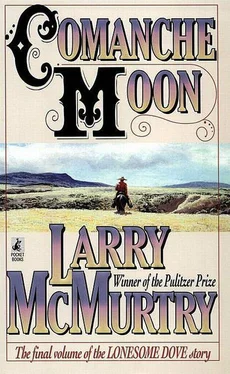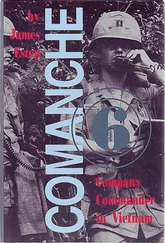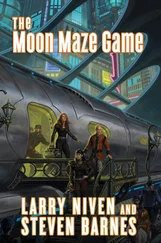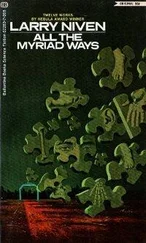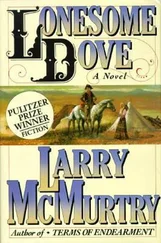Hardest were the days when Ahumado failed to lift the binoculars, when he seemed indifferent to the white man hanging in the cage. On those days, the days when Ahumado did not look, the birds seemed to know that Scull was losing. The great vultures roosted in a line on the cliff above him, waiting. Pigeons and doves, the staple of Scull's diet, rested in numbers on the cage itself; he could, with a little stealth, have caught a week's supply, and yet he didn't.
On such days it was often only the evening light that brought Scull out of despair. The space before him would grow golden at sunset, leaving the distant mountains in haze until the glow faded and they became blue and then indigo. Staring into the distance, Scull would slowly relax and forget, for a time, the struggle he had to wage.
It was on such an evening that he began to file away the bindings on the side of the cage that faced outward, away from the cliff. If the vast echoing space was to be his balm and his ally, he didn't want bars interfering with his relation to it. The bars were ugly anyway, and stained with bird droppings.
He didn't want them between himself and the light of morning or evening.
Once, long before, as a youth, walking in Cambridge, he had seen a man of the East, a Buddhist monk who sat cross-legged in bright orange robes by the Charles River; the man was merely sitting, with his robe covering his legs and his hands folded in his lap, watching the morning sunlight scatter gold over the gray water.
The memory came back to Scull as he cut through the bindings at the front of his cage. The Buddhist had been an old man, with a shaven head and a long drooping wisp of beard; he had attentive eyes and he seemed to be thoughtfully studying the air as it brightened amid the buildings of Cambridge.
Scull, high on his cliff, thought he might emulate the old Buddhist man he had seen only that once, on a Cambridge morning, by the Charles River. When it came to air, he had, before him, a grander prospect for study than the old man had by the Charles. Before him, indeed, was a very lexicon of air, a dictionary or cyclopedia that would be hard to exhaust. He could study the gray air of morning, the white air of the bright noon, the golden air of evening. He wanted no bars to interfere with his contemplation, his study of the airy element--and to that end he sawed and sawed, with his little file, well into the deep Mexican night.
Ahumado had just walked out of the cave when Scull gave a great yell. At first Ahumado didn't look up. He knew well that the white man, Scull, craved his attention-- the stronger prisoners always craved his attention, or, at least, the attention of the people in the camp.
They didn't want to be forgotten by the people who were alive--they wanted to remind everyone that they were still of the living.
But then one of the vaqueros shouted and Ahumado looked up in time to see Scull heave the front of the cage as far as he could pitch it. The people sitting with coffee or tobacco jumped up when they saw what was happening--they got out of the way of the piece of cage that was falling. The only thing that didn't get out of the way was a red hen; the falling piece of cage hit the hen and caused her to flop around for a minute or two--then she died.
Ahumado picked up the binoculars and looked up at the man in the cage--fora moment he was annoyed because he supposed Scull had decided to commit suicide, as the sly Comanche had. With the front of the cage gone Scull could jump to his death at any time, which was a thing not to be tolerated.
Ahumado did not put prisoners in the cage in order to provide them with a choice in the matter of their own deaths.
Yet, when Ahumado looked, he saw that Scull did not seem to be getting ready to jump. He was sitting comfortably in the cage, singing one of the songs he was always singing. This penchant for song was another annoying thing about the man. It made the villagers restive. Many of them considered Scull to be a powerful witch. There were a few, probably, who thought that Scull might prove to be more powerful than Ahumado. Why was he singing? Why wouldn't he just die? The most logical answer was that Scull was a witch.
Ahumado had carefully considered that possibility when Scull began scratching on the rock, and he was still a little uneasy about it. The notion that Scull might make the mountain fall had come to him in a dream, and dreams of that sort were not to be lightly disregarded. Although time passed and the mountain didn't fall, Ahumado did not forget his dream and continued to be suspicious of Scull.
Witches were often known to bide their time. An old witch from the south, who had a grudge against his father, had caused a tumour to grow in his father's stomach.
Though they caught the old witch and cut her throat, the tumour continued to grow in his father's stomach until it killed him. It was a thing Ahumado had never forgotten. He knew better than to underestimate the patience of a powerful witch.
Now Scull had cut open his cage--he could leap out if he wanted to. The old woman Hema, the one who had foamed at the mouth when she was listening to the mountain, came hobbling over, carrying the red hen that the fallen cage had killed.
"We should cut open this hen and look inside her," Hema said. "He might have put a message in her." "No," Ahumado said, "if we look inside her we will only find chicken guts." In his view vision people who tried to see the future by looking at the entrails of animals were frauds. The future might be visible in the smoke that rose from a campfire, if only one knew how to look into the smoke, but he didn't believe that the spirits who made the future would bother leaving messages in the guts of goats or hens.
He gave old Hema the hen, to get rid of her, but before she left she came out with another prophecy, one that was a little more plausible.
"A great bird is going to come and get the white man soon," old Hema said. "The great bird lives on a rock at the top of the world. The reason the white man cut away the front of his cage is because the great bird will soon be coming to fly him back to Texas." "Go away and eat your hen," Ahumado said.
She was a long-winded old woman and he did not want to waste his mornings listening to her. Still, his mind was not entirely easy where Scull was concerned. Once or twice, when he looked up and saw the white man sitting there in the open cage, he considered taking his Winchester and shooting the man right where he hung. That would end his worry about the mountain falling down. The mention of the great bird was worrisome too; there were many stories about a great bird that lived at the top of the world.
Perhaps the white man's strange singing was in the language of the birds. Perhaps he was telling the eagles that flew around the cage to go to the top of the world and bring the great bird. The language that Scull sang in was not the language of the Texans; perhaps it was the language of the birds.
To make matters even more uncertain, that very afternoon the largest vulture that anyone had ever seen came soaring over the cliff and flew down past the cage. The vulture was so large that for a moment Ahumado thought it might .be the great bird.
Though it proved to be only an exceptionally large vulture, its appearance annoyed him.
Big Horse Scull was proving to be the most troublesome prisoner he had ever captured; Scull did so many things that were witchlike that it might be better just to kill him.
That evening, by the campfire, he discussed the matter with old Goyeto, the skinner. Usually old Goyeto had only one response when asked about a prisoner; he wanted to skin the prisoner at once. This time, though, to Ahumado's surprise, Goyeto took a different tack.
"You could sell him to the Texans," Goyeto said. "They might give you many cattle--nobody around here has very many cattle." Ahumado remembered that Scull had mentioned a ransom. He had never bargained with the Texans --he had only taken from them, in the way of a bandit. But the old simple-minded skinner, Goyeto, had made a good point. Perhaps the Texans would want Big Horse Scull so badly that they would bring them a lot of cattle.
Читать дальше
